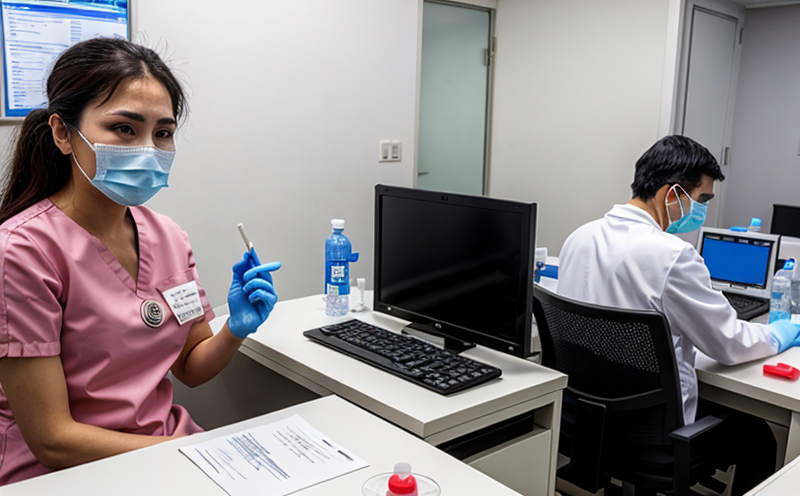Monkeypox Virus Detection Testing in Exotic Animals
The detection and identification of the monkeypox virus (MPXV) in exotic animals is a critical component of public health and biosecurity measures, especially in regions where zoonotic diseases are prevalent. MPXV is a member of the Orthopoxvirus genus within the family Poxviridae, closely related to variola virus (the causative agent of smallpox) and vaccinia virus. The virus can be transmitted from animals to humans through direct contact or via aerosols.
The emergence of monkeypox in non-endemic regions has highlighted the need for robust testing protocols to monitor and mitigate outbreaks. This is particularly important given that exotic pets, zoo animals, and other non-human primates may serve as potential reservoirs for MPXV. The primary goal of this service is to provide accurate, timely detection of the virus through advanced diagnostic methods.
Our laboratory employs a multi-step process that starts with proper specimen collection from the animal. Specimens are typically collected via swabbing or blood sampling and transported under strict temperature control to our facility. Upon arrival, the samples undergo rigorous preprocessing before being analyzed using nucleic acid amplification tests (NAATs) such as real-time PCR.
The testing protocol is based on the ISO 15189 standard for quality management systems in clinical laboratories, ensuring that all processes adhere to international best practices. The NAAT method allows for highly sensitive and specific detection of viral DNA or RNA, providing results within a few hours. This rapid turnaround time is crucial for implementing effective quarantine protocols and preventing further spread.
Once the test results are available, they are meticulously analyzed by our team of virologists and microbiologists. Any positive findings are reported promptly to the relevant authorities, along with recommendations for isolation and treatment measures. The entire process from sample collection to result reporting is designed to meet strict compliance standards, ensuring that stakeholders receive reliable information.
The significance of this testing service extends beyond mere identification; it plays a pivotal role in preventing the potential spread of MPXV. By providing early detection, we empower regulatory bodies and healthcare providers with critical insights into managing outbreaks. Additionally, our expertise in handling such specialized samples helps ensure that exotic animals are not unnecessarily subjected to euthanasia if they test positive.
Our commitment to excellence is reflected in the use of cutting-edge technology and experienced personnel dedicated solely to this service. We continuously update our protocols based on the latest scientific advancements, ensuring that we remain at the forefront of diagnostics for MPXV.
Applied Standards
The testing procedures for detecting monkeypox virus in exotic animals are guided by several international standards and guidelines:
- ISO 15189:2012 - Quality management systems for bodies providing medical laboratories
- ASTM E3481-19 - Standard practice for nucleic acid testing of human and animal specimens using real-time reverse transcription polymerase chain reaction (rRT-qPCR)
- WHO recommendations on the use of real-time PCR in diagnosing monkeypox virus infections
These standards ensure that our processes are consistent, reliable, and compliant with global health regulations.
Benefits
The implementation of this testing service offers numerous benefits to various stakeholders:
- Public Health Protection: Early detection enables public health authorities to take swift action, minimizing the risk of widespread outbreaks.
- Biosecurity: Ensures that exotic animals are not inadvertently spread as vectors for MPXV in non-endemic areas.
- Risk Management: Provides valuable data for risk assessment and mitigation strategies.
- Animal Welfare: Prevents unnecessary euthanasia by offering accurate diagnostic results.
- Regulatory Compliance: Ensures that all testing procedures adhere to international standards, facilitating smoother interactions with regulatory bodies.
The overall impact of these benefits is a more resilient and secure healthcare system capable of addressing zoonotic diseases effectively.
Industry Applications
- Zoos: Regular testing helps in maintaining biosecurity within zoo environments, ensuring the safety of both animal populations and visitors.
- Pet Owners: Provides peace of mind for owners whose exotic pets may be exposed to MPXV.
- Veterinarians: Enables earlier diagnosis and better treatment outcomes in cases where animals are suspected of being infected.
- Research Institutions: Supports scientific research on the virus by providing reliable data points for studies.
The versatility of our testing service ensures that it meets diverse needs across multiple sectors.





